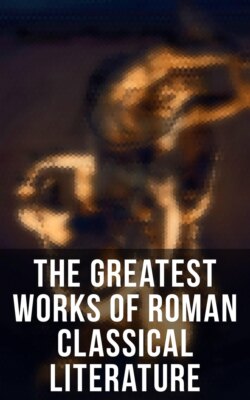Читать книгу The Greatest Works of Roman Classical Literature - Луций Анней Сенека - Страница 115
На сайте Литреса книга снята с продажи.
LXVI.
ОглавлениеTable of Contents
He whose glance scann'd clearly the lights uncounted of ether,
Found when arises a star, sinks in his haven again,
How yon eclipsed sun glares luminous obscuration,
How in seasons due vanishes orb upon orb;
How 'neath Latmian heights fair Trivia stealthily banish'd
Falls, from her upward path lured by a lover awhile;
That same sage, that Conon, a lock of great Berenice
Saw me, in heavenly-bright deification afar
Lustrous, a gleaming glory; to gods full many devoted,
Whiles she her arms in prayer lifted, as ivory smooth;
In that glorious hour when, flush'd with a new hymeneal,
Hotly the King to deface outer Assyria sped,
Bearing ensigns sweet of that soft struggle a night brings,
When from a virgin's arms spoils he had happily won.
Stands it an edict true that brides hate Venus? or ever
Falsely the parents' joy dashes a showery tear,
When to the nuptial door they come in rainy beteeming?
Now to the Gods I swear, tears be hypocrisy then.
So mine own queen taught me in all her weary lamentings,
Whiles her bridegroom bold set to the battle a face.
What? for an husband lost thou weptst not gloomily lying?
Rather a brother dear, forced for a while to depart?
This, when love's sharp grief was gnawing inly to waste thee!
Ah poor wife! whose soul steep'd in unhappiness all,
Fell from reason away, nor abode thy senses! A nobler
Spirit had I erewhile known thee, a fiery child.
Pass'd that deed forgotten, a royal wooer had earn'd thee?
Deed that braver none ventureth ever again?
Yet what sorrow to lose thy lord, what murmur of anguish!
Jove, how rain'd those tears brush'd from a passionate eye!
Who is this could wean thee, a God so mighty, to falter?
May not a lover live from the beloved afar?
Then for a spouse so goodly, before each spirit of heaven,
Me thou vowd'st, with slain oxen, a vast hecatomb,
Home if again he alighted. Awhile and Asia crouching
Humbly to Egypt's realm added a boundary new;
I, in starry return to the ranks dedicated of heaven,
Debt of an ancient vow sum in a bounty to-day.
Full of sorrow was I, fair queen, thy brows to abandon,
Full of sorrow; in oath answer, adorable head.
Evil on him that oath who sweareth falsely soever!
Yet in a strife with steel who can a victory claim?
Steel could a mountain abase, no loftier any thro' heaven's
Cupola Thia's child lifteth his axle above,
Then, when a new-born sea rose Mede-uplifted; in Athos'
Centre his ocean-fleet floated a barbarous host.
What shall a weak tress do, when powers so mighty resist not?
Jove! may Chalybes all perish, a people accurst,
Perish who earth's hid veins first labour'd dimly to quarry,
Clench'd in a molten mass iron, a ruffian heart!
Scarcely the sister-locks were parted dolefully weeping,
Straight that brother of young Memnon, in Africa born,
Came, and shook thro' heaven his pennons oary, before me,
Winged, a queen's proud steed, Locrian Arsinoë.
So flew with me aloft thro' darkening shadow of heaven,
There to a god's pure breast laid me, to Venus's arms.
Him Zephyritis' self had sent to the task, her servant,
She from realms of Greece borne to Canopus of yore.
There, that at heav'n's high porch, not one sole crown, Ariadne's,
Golden above those brows Ismaros' youth did adore,
Starry should hang, set alone; but luminous I might glisten,
Vow'd to the Gods, bright spoil won from an aureat head;
While to the skies I clomb still ocean-dewy, the Goddess
Placed me amid star-spheres primal, a glory to be.
Close to the Virgin bright, to the Lion sulkily gleaming,
Nigh Callisto, a cold child Lycaonian, I
Wheel obliquely to set, and guide yon tardy Bootes
Where scarce late his car dewy descends to the sea.
Yet tho' nightly the Gods' immortal steps be above me,
Tho' to the white waves dawn gives me, to Tethys, again;
(Maid of Ramnus, a grace I here implore thee, if any
Word should offend; so much cannot a terror alarm,
I should veil aught true; not tho' with clamorous uproar
Rend me the stars; I speak verities hidden at heart):
Lightly for all I reck, so more I sorrow to part me
Sadly from her I serve, part me forever away.
With her, a virgin as yet, I quaff'd no sumptuous essence;
With her, a bride, I drain'd many a prodigal oil.
Now, O you whom gladly the marriage cresset uniteth,
See to the bridegroom fond yield ye not amorous arms,
Throw not back your robes, nor bare your bosom assenting,
Save from an onyx stream sweetness, a bounty to me.
Yours, in a loyal bed which seek love's privilege, only;
Yieldeth her any to bear loathed adultery's yoke,
Vile her gifts, and lightly the dust shall drink them unheeding.
Not of vile I seek gifts, nor of infamous, I.
Rather, O unstain'd brides, may concord tarry for ever
With ye at home, may love with ye for ever abide.
Thou, fair queen, to the stars if looking haply, to Venus
Lights thou kindle on eves festal of high sacrifice,
Leave me the lock, thine own, nor blood nor bounty requiring.
Rather a largesse fair pay to me, envy me not.
Stars dash blindly in one! so might I glitter a royal
Tress, let Orion glow next to Aquarius' urn.
